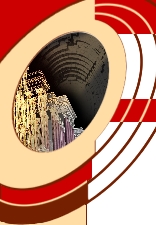|
|
|
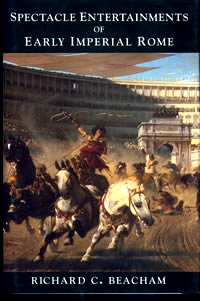
|
|
Spectacle Entertainments of Early Imperial Rome
Yale University Press
The presentation in the the theatre, gladiatorial combats, chariot races in the circus, animal hunts, triumphal processions, and other public entertainments of early imperial Rome served as tangible expressions of Roman ideology and power. This engagingly written book describes these lavish spectacles, traces their evolution uner Rome's political masters from Caesar to Nero, and discusses their social and political significance.
Drawing on primary accounts of ancient historians as well as on archaeological evidence, Richard C. Beacham examines the stagecraft of Roman statecraft, providing illuminating accounts of such episodes as the intensely theatrical rivalry of Caesar and Pompey, Augustus's performance in what the Princeps himself called the "mime of life" and the demented antics of Caligula. He shows how Roman politicians and emperors created awesome specacles of mass appeal in a potent exercise of demagoguery. He argues that the Roman people in turn jealously gaurded their right to be entertained, regarding the theatre, circus, and arena as political venues in which to demonstrate their power and vent their opinions. |
|
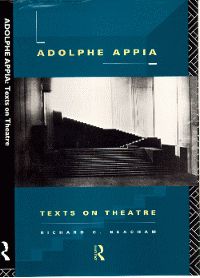
|
|
Adolphe Appia: Texts on Theatre
Routledge
Adolphe Appia swept away the foundations of traditional theatre and set the agenda for the development of theatrical practice for the 20th century and beyond. This book brings together for the first time selections from all his major works. The publication of these writings, many of which have long been unavailable in English, represents a significant addition to our understanding of the development of theatrical art. It is an invaluable sourcebook for theatre students and welcome as an important contribution to the literature of the modern stage. |
|
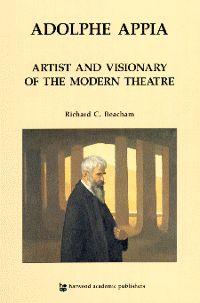
|
|
Adolphe Appia: Artist and Visionary of the Modern Theatre
Harwood Academic Press
This book is an account, analysis, and critical evaluation of the work of the Swiss theatre designer and theorist, Adolphe Appia (1862- 1928). Appia has long been recognised and revered as the most important innovator in the concept and use of stage lighting, but his imagination and work extended far beyond this to embrace the fundamental reform of scenic design and the use of theatrical space. Many of his ideas, which were extremely advanced for his time, have now been widely accepted and put into practice, but Appia has not received the credit and attention he deserves, and much of his most important work has been difficult to obtain in English. This book aims to redress this balance, both by a close critical analysis of his contribution to theatre and by providing directly relevant examples from Appia's immensely important practical work, placed in the context of his innovative theoretical writing. |
|
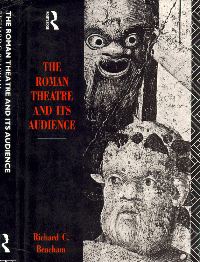
|
|
The Roman Theatre and its Audience
Harvard University Press
Although Roman drama, stagecraft, and theatre architecture have had far greater influence upon the development of the modern theatre than did the theatrical legacy of the Greeks, these subjects have been relatively neglected by academic investigation and discussion. This book traces the history of the Roman theatre--from its origins in the fourth century BC to the demise of formal theatrical activity at the end of antiquity--with the purpose of identifying and describing that theatre's most important characteristics and legacy.
A major theme and focus of the study is the way in which the Roman audience both influenced and reacted to the nature and occasion of theatrical performance, and the insights which this aspect contributes to our understanding of Roman stagecraft. Dr. Beacham has himself translated Roman drama and produced it for contemporary audiences upon a carefully researched reconstruction of the type of temporary stage on which such drama was first performed, and the book draws extensively on his first-hand experience. As the work of a theatre historian and theatre practitioner, it synthesizes and extends earlier studies which have analysed the Roman theatre from the particular perspectives of philology, literary criticism, or archaeology. Its discussion of the vexed subject of Roman scenic practice is particularly intriguing, as is its detailed account of how a typical Roman comedy functions in performance. | |
|
|
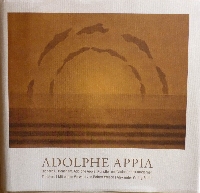
|
|
Adolphe Appia: Künstler und Visionär des Modernen Theaters
Alexander Verlag
This book, a translated and extensively expanded version of Beacham’s earlier English language critical biography of Appia, is the first major scholarly publication devoted to Appia in German. Much of Appia’s most innovative and influential work first took place in Germany, and his ideas have had a profound effect upon German theatrical and operatic production. The book provides a very extensive account, analysis, and critical evaluation of his work, including an introductory essay by Robert Wilson. It is enriched by many full-page colour illustrations of Appia’s designs, offering the most extensive published examples of these ever to appear. | |
|
|
|
|
